|
Farm Safety Guide
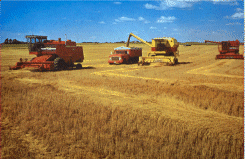
In a typical year, the National Safety Council says 1,200 persons
working in agriculture die from job-related injuries. Another
140,000 are injured. Damage to farm property, machinery and crops is
in the billions of dollars.
As a farmer or rancher, you understand the time, energy and capital
wrapped up in a successful farm or ranch operation.
No doubt, you
also realize the risk inherent in this dangerous occupation.
While insurance is designed to lift much of the financial burden
from your shoulders,
it can't remove the inconvenience nor loss of
life or limb.
There are some steps you can take to reduce the likelihood of damage
or injury.
This brochure looks at four areas: General Farm Safety,
Fire Prevention, Security,
and Buildings.
Tractors
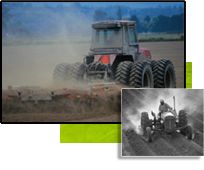
- Do not allow children
to ride on tractors
- Have roll-over
protection (ROPS) on all tractors.
- Have all operators
complete a tractor safety course.
- Make sure all equipment
has proper working lights and slow moving vehicle signs.
- Wear seat belts when
operating all vehicles, including farm machinery.
- Make sure all power
take-offs, belts and augers have proper guards and shields.
|
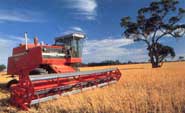 Farm
machinery Farm
machinery
- Turn off power before
adjusting, servicing, or unclogging power-driven machinery.
- Make sure loads being
towed are properly hitched to the drawbar and that pins and
chains are in place.
- Display slow moving
vehicle signs on machinery towed or driven on the highways.
- Have shields and guards
in place and maintained at all times.
- Inspect and maintain
all hydraulic hoses and couplings.
- Make sure tires are
properly inflated.
|
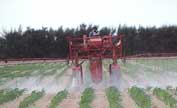 Chemicals Chemicals
- Read and follow
manufacturer's directions for storage, handling and
application of chemicals. Contact your county extension agent
for additional information or training on chemical handling.
- Use Personal Protective
Equipment (PPE), including gloves, eye/face shields, ear
plugs, respiratory protection, and hats.
|
Other
hazards
- Wear devices to protect
your hearing (studies show more than 50 percent of older
farmers have hearing loss)
- When entering pits in
hog barns, always wear a respirator to avoid being overcome by
the fumes.
- Inspect and maintain
all machinery, equipment, and tools to keep them in proper
working condition.
- Have first-aid kits
available and develop an emergency plan.
|
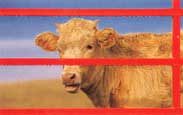 Security Security
Protecting your property -- and, more important -- your safety and
well-being -- has become a high priority in rural areas these days.
Some suggestions:
- Maintain adequate
lighting around the farm yard and in the home.
- Have singe cylinder
deadbolt locks on all entrance doors to your home. Keep farm
buildings locked.
- Record serial numbers
of all equipment. Mark equipment and livestock to aid in the
recovery should a theft occur.
- Ask neighbors to check
the farm regularly when you are gone.
- Inspect and maintain
fences used for livestock.
|
Buildings
Farm buildings pose a number of perils-ranging from how they're put
together to the equipment you use in them. Here's how to avoid some
of the pitfalls:
- Have an electrician
verify that all electrical systems and equipment are properly
grounded. This can help reduce the chance of shocks and/or
production losses to livestock.
- Install
corrosive-resistant wiring, fixtures, and boxes in hog and
dairy barns.
- Weld in buildings only
in well-ventilated areas away from flammable or combustible
materials.
- Be sure grain bins have
permanent ladders inside and out. Use a lifeline when entering
a bin or silo and wear a protective mask.
- Do not use extension
cords as permanent hookups.
- Hang brooder lamps by
chains, not the electrical cords.
- Insulation in all
buildings should be covered with a 15-minute fire barrier (for
example, 1/2 inch rate gypsum board, and 5/8 inch plywood) to
reduce the likelihood of fires.
|
Fire prevention
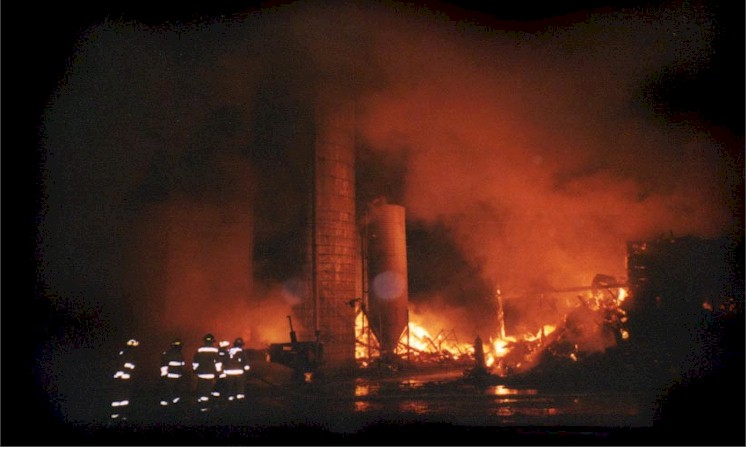
Losses caused by fire and lightning account for almost 60 percent of
fire claims paid. You probably are a long way from a
fire department, so fire safety on the farm has added importance.
The following steps can help reduce the likelihood that you will be
affected:
- Maintain smoke
detectors throughout your home and check them regularly to
verify that batteries are in proper working condition. (Change
batteries at least every 6 months.)
- Place approved fire
extinguishers in your home, on large tractors or combines, and
in barns, shops and machine sheds.
- Develop an evacuation
plan for family members, including a meeting place.
- Have a licensed
electrician periodically inspect your electrical systems. Be
sure updates to your current electrical systems are performed
by a qualified electrician.
- Inspect and maintain
heating units before the beginning of each heating season.
- Clean
fireplace/woodstove chimneys prior to the heating season-more
often if you use the fireplace often.
- Install surge
protection on service panels in the home and in dairy or hog
barns.
- Consider installing a
lightning protection system. Consult a UL or LPI (Lightning
Protection Institute) approved contractor.
- Practice good
maintenance of your farm or ranch. Cut weeds and grass around
buildings, maintain a clean shop, and store all chemicals and
flammable liquids properly.
- Don't burn trash
outdoors on windy days and don't leave fires unattended.
By following these
guidelines you can help make your farm a safer place for your family
and employees.
|
 Contact us by phone (800) 874-9191, FAX (602) 992-8327
Contact us by phone (800) 874-9191, FAX (602) 992-8327
or email below for more
product information.

A Key
Component of the Allen Financial Difference
|


